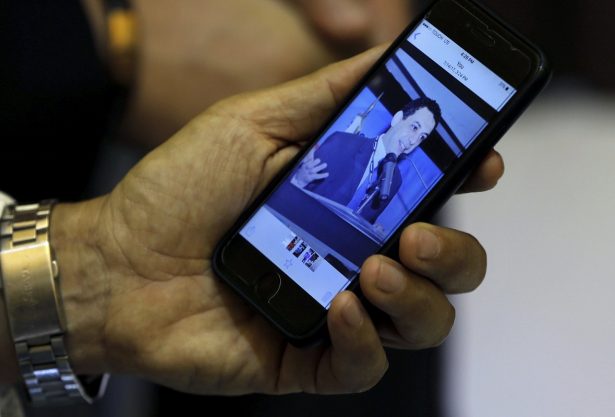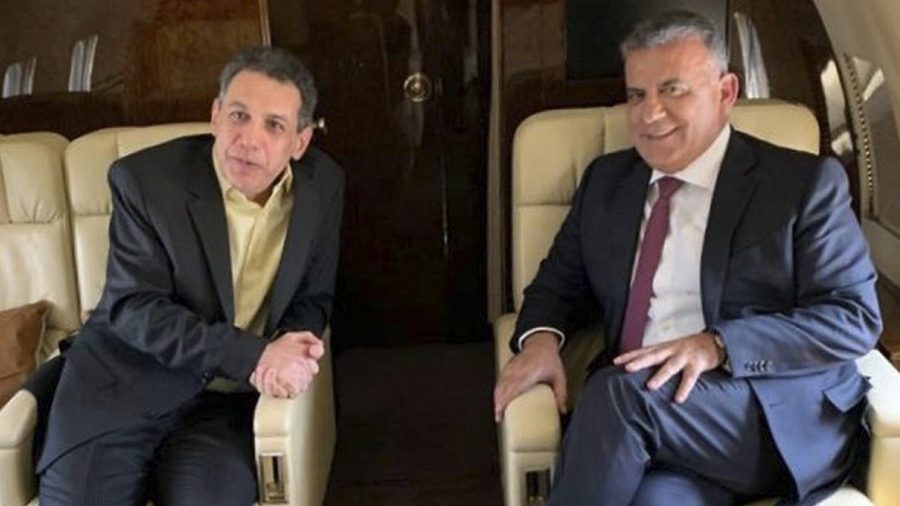BEIRUT—A U.S. permanent resident and Lebanese businessman who was imprisoned for years in Iran has been freed and was on his way back to his native Lebanon on June 11, a development that comes amid heightened tensions between Iran and the U.S. after President Donald Trump withdrew America from Tehran’s nuclear deal.
Nizar Zakka, held in Iran since 2015 on charges of spying, was on a plane accompanied by the chief of Lebanon’s General Security Directorate, Maj. Gen. Ibrahim Abbas, heading to the Lebanese capital, according to a photo released by the directorate on its official Twitter page.
The photo showed Zakka, wearing a dark suit, seated with Abbas aboard the private jet carrying them to Lebanon.
Zakka is one of several prisoners with either dual nationality or links to the West held in Iran. Lebanese officials have for years asked for his release, and it was not clear why Iran decided to act now. Zakka was expected to head straight from the airport to the presidential palace, where he will be received by President Michel Aoun, who had personally requested his release.
المدير العام للأمن العام #اللواء_عباس_ابراهيم في الطريق من طهران الى لبنان يرافقه نزار زكا بعد إطلاق سراحه من قبل السلطات الإيرانية، على أن يتوجها عند الوصول الى قصر بعبدا. pic.twitter.com/wzYaGMdBn0
— الأمن العام اللبناني (@DGSG_Security) June 11, 2019
Earlier on Tuesday, an Iranian judiciary official confirmed that Tehran has agreed to hand over Zakka to Lebanese officials, providing the first official confirmation of his release, which had been anticipated for days.
“A court has accepted the condition of freedom of Nizar Zakka and he will be handed over to Lebanese officials,” judiciary spokesman Gholamhossein Esmaili said, according to the judiciary’s Mizan news agency.
A report Monday on the Iranian state TV’s website mirrored an earlier one carried by the semi-official Fars news agency about Zakka, an internet freedom advocate who was arrested in September 2015 while trying to fly out of Tehran. He had just attended a conference there on the invitation of one of the country’s vice presidents.
State TV, like Fars, quoted an anonymous source saying Zakka’s forthcoming release should only be seen as a “sign of respect” for the Lebanese militant Hezbollah group and its leader, Hassan Nasrallah.
“In this regard, no negotiations have taken place at any level with any person or any government,” state TV said.
Iran says detained U.S. resident Nizar Zakka, an accused U.S. spy, to be released to Lebanon https://t.co/FXUUO4lf5d pic.twitter.com/RtWQtYBHGu
— CBS News (@CBSNews) June 11, 2019
Esmaili stressed that Zakka’s release was within “the frame of the law.”
“We reviewed the (Lebanese) president’s request through the Supreme National Security Council,” Esmaili said. “Also, the Lebanese Hezbollah group considered the approval of his freedom as prudent.” The leader of the Iranian-backed Hezbollah has not made public comments about Zakka’s imprisonment, but pro-Hezbollah media have said that Nasrallah had in recent days urged the Iranians to facilitate his release.
State TV later quoted an anonymous source as saying Zakka would be released on Tuesday afternoon and will be allowed to leave Tehran.
WATCH: Lebanese man held in Iran expected to go home on Tuesday
The release of Nizar Zakka will take place on Tuesday after the completion of the judicial proceedings, which are nearly done.
READ: https://t.co/8EI5rOLmGA pic.twitter.com/a7wIflE7Te
— Middle East Monitor (@MiddleEastMnt) June 11, 2019
In 2016, Iran sentenced Zakka to 10 years in prison. Authorities accused him of being an American spy, allegations vigorously rejected by his family and associates.
Zakka, who lives in Washington and holds resident status in the U.S., leads the Arab ICT Organization, or IJMA3, an industry consortium from 13 countries that advocates for information technology in the region.
The White House said it is “thankful” for Zakka’s release from Iranian custody, but wants to see other Americans who are detained there released as well. “The big question is there’s several others and we want to see those people released as well,” said Press Secretary Sarah Sanders. She declined to say whether the U.S. government was involved in securing Zakka’s release.

Shahindokht Molaverdi, an adviser to President Hassan Rouhani who as a vice president invited Zakka to Iran, told the AP in September that Iran’s government had “failed” to help Zakka.
“This is in no way approved by the government,” Molaverdi said. “We did all we could to stop this from happening, but we are seeing that we have failed to make a significant impact.”
By Bassem Mroue

